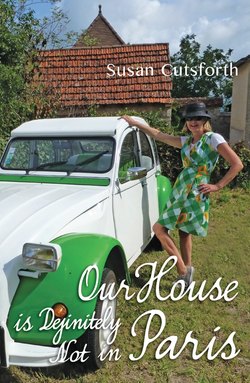Читать книгу Our House is Definitely Not in Paris - Susan Cutsforth - Страница 15
На сайте Литреса книга снята с продажи.
Filling in the Gaps
ОглавлениеEvery year, we can rely on Jean-Claude to fill in the gaps on all that has unfolded in our absence. He always regales us with stories and shares with us the events that have taken place in Cuzance. This includes who has passed away. With the loss of our neighbour, Madame Chanteur, I know that in our village of mostly older inhabitants, there will be more in the years to come. I already know from previous visits that, in a particularly harsh winter, some of the villagers will not wake to a new sunrise. For now, I am glad that the cast of characters in Cuzance that I am familiar with and have grown fond of — despite still not being able to fully communicate with them — are still all in place.
To balance impending loss and sadness, Jean-Claude is able to share the joyous news of the arrival of their petite grandson, Basile. He announces that after a mere twenty minutes, ‘He popped out like a champagne cork.’ It is France after all, I think when I hear this original and apt description. As Françoise will now stay in Lyon for a fortnight to help Bénédicte, Jean-Claude has the responsibility for their other two grandchildren, Celeste and Balthazar, who are arriving from Berlin for their summer vacances. We wonder how he will possibly cope. As it is, when Françoise is at their apartment in Lyon, Jean-Claude exists on ready-made meals for dîner from the supermarché.
France is surely the only country in the world where discussion, and indeed a forthcoming debate, centre on the custom of kissing. I have enthusiastically embraced the de rigueur custom of exchanging a kiss on each cheek with our French amis. Indeed, it is one I have passionately transferred to my life on the other side of the world. All those who know me well, friends and even close colleagues, accustomed by now to our French life, know to expect this from me. They have entered willingly into this French cultural exchange.
Reuniting with Jean-Claude means that once again we are privy to glimpses into French protocol and customs that we would possibly never be aware of. He shares a fascinating insight into the fact that different regions have different customs when it comes to the exchange of kisses when greeting friends. We are by now very familiar with the one peck on each cheek. This exchange takes place even if it happens to be the second, or indeed, third time you have encountered your amis within the space of a single day.
Sometimes there are three exchanged, backwards and forwards on your cheeks. This is something I’ve never quite understood. What dictates that it is more than the customary two? I have simply surmised that it is a demonstration of the degree of affection. Yet it transpires that a bise and the number exchanged all depends on the département in which you live. In Paris, it would seem there are only ever two kisses. I am sure in the heady, demanding world of politics and business there would clearly be no time for any more. Mind you, the number of politicians, indeed French presidents, with a notorious predilection for affairs, would involve somewhat more than counting the number of kisses on the cheek.
In other regions, Jean-Claude tells us, four is in fact the rule of kissing. There are further complications though. Apparently, in some départements the first bise is on the left cheek, while in other regions it is on the right. I can’t grasp the simple elements of the language, let alone the complexity of kissing. Even more amazing is when he concludes this anecdote by telling us that a movement has started to reduce the exchange of kisses to a mere one. The group in Brittany opposed to the gesture of so many kisses base their stance on claiming it has all gone too far. To think a polite social greeting could generate such fervour. The jury is still out on this.
